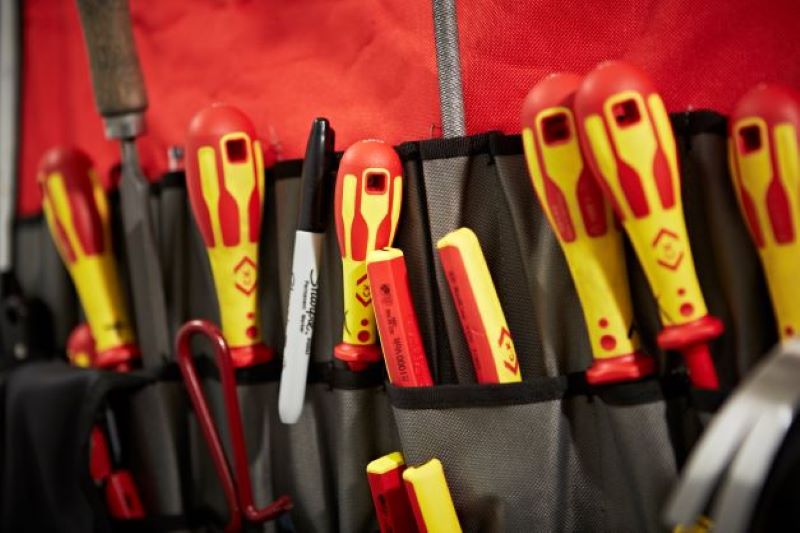
The opportunity to start your own business as an electrician is one of the biggest factors that attracts many to the electrical installation industry. Working for yourself gives you greater command over your work-life balance and can often mean higher earning potential.
The continued high demand for electricians in the UK, driven by an ageing workforce, homebuilding and infrastructure projects, and a focus on renewable energy initiatives, means that now could be the perfect time to capitalise and begin working for yourself.
If starting your own business is something you’ve been considering, here are a few things to keep in mind, both before you’re up and running and once you’ve launched your operation.
Experience and qualifications for self-employed electricians
Becoming a fully qualified electrician is the first step towards running your own business, and ensuring you’ve undertaken the required training with a provider recognised by industry regulators is vital when it comes to safely and legally carrying out work.
Able Skills is an accredited centre, meaning all of our electrical courses are taught and certified to the latest regulations from City & Guilds and NET.
Typically, electricians who go on to start their own business will have built a good level of experience working within the industry beforehand.
Commercial, domestic electrician or electrical contractor?
The environment you plan to work in will also dictate the level of training you require and the amount of experience you might need before setting yourself up as a self-employed electrician.
Domestic electrician
Since Part P of the Building Regulations was introduced in 2005, domestic electrical installations have become a regulated building service. Part P requires that all such work is either subject to Local Authority Building Control, or is carried out by members of an electrical competent persons scheme.
However, if you want to join a competent person scheme, you'll need to hold the NVQ Level 3. This can only be achieved by undertaking the Level 2 and Level 3 Diplomas in Electrical Installations, or equivalent, as candidates need a recognised electrical qualification like NVQ Level 3 along with the 18th Edition Wiring Regulations qualification.
Commercial electrician
Anyone wanting to work in a commercial setting needs to be fully qualified, meaning you need an electrical installation qualification at Level 2 and Level 3, and NVQ and AM2 assessments or suitable equivalent training and qualifications. An ECS Gold Card indicates you can work unsupervised in electrical installation.
If you plan on working on construction sites, you’ll need an ECS (Electrotechnical Certification Scheme) card (it's the equivalent of the CSCS in the electrotechnical industry). Applicants for the ECS card must meet the following criteria:
- Hold a recognised UK Level 3 Apprenticeship or NVQ or equivalent qualification
- Hold a current ECS Health, Safety and Environmental Assessment
- Hold a recognised 18th Edition Wiring Regulations qualification
Contract electrician
There is also the option to work as an independent contractor. This means providing specialist services for an organisation under a contract for services. Independent contractors working within the UK should be aware of the IR35 tax legislation.
Setting up and registering your business as a self-employed electrician
Making sure you’ve registered your business with HMRC is a crucial first step, and sorting this out early can save you a lot of administration headaches further down the line.
This means deciding whether you want to operate as a limited company or a sole trader. Both options come with their own advantages and disadvantages—setting up as a sole trader is a more straightforward process as it's a simple business structure. The set up costs nothing, comes with less paperwork, and your details and earnings aren’t publicly available.
Gov.UK has a step-by-step tool to help you check if being a sole trader is right for you and what you need to do for registration and record keeping.
Alternatively, as a limited company, there’s a legal distinction between you and your business, meaning if you get into debt, your personal assets are not at risk as there's a limited liability. This does come with different responsibilities for registration and company and accounting records.
For more advice on which business set up is right for you, visit the Gov.uk website.
Regulations and insurance
Holding the appropriate insurance is essential for both you and your customers. Public liability insurance is perhaps the most important, as it helps cover legal costs and compensation should someone be injured or property damaged due to your work.
It’s also advisable to look into personal accident insurance, as this will offer financial reassurance should you become injured and unable to work. It’s also worth considering tools insurance and vehicle insurance, protecting you should your property be stolen.
Marketing yourself
Going self-employed means you must be able to sell yourself.
Word-of-mouth remains a lead generator when it comes to the trade industries; however, solely relying on this will hamper you in terms of attracting new business.
Having a social media presence and a professional-looking website is a must these days, as these will often be the first stop for clients considering your services. Traditional methods, such as signwriting vans and business cards can still be incredibly effective in getting your name out there too.
Begin your journey with Able Skills
If you’re ready to begin your journey towards becoming a self-employed electrician, the City & Guilds Combined Level 2 & Level 3 Electrical Course is the ideal programme for anyone entering the profession or the Able Skills Gold Card Course if you're looking to become fully qualified.
If you’re ready to begin your training, or need a little more information, give us a call on 01322 280 202, request a brochure or pop into our training centre for a chat.
Editor's note: This post was originally published 15 November 2021. Updated 28 April 2025.
 Electrician Training
Electrician Training